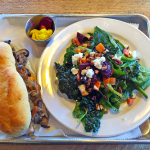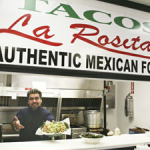The scenario: An alarm goes off in a dark bedroom. A lamp switches on. A man arises, dons a starched white chef jacket, places a coffee pod briefly in a shiny, complicated-looking appliance, and enjoys the beverage that emerges. Before leaving home, he grabs a hand-made shopping basket he picked up on his last trip to Guatemala, and says goodbye to his faithful dog.
He gets into his gleaming SUV and drives to the local farmers’ market, where he strolls the aisles of gorgeous, perfect produce with the basket in the crook of one elbow. He’s enthusiastically greeted by vendors and market-goers alike; he’s a celebrity here. He asks for tasting samples of several items, then briefly haggles with the stall attendant over pricing and delivery terms. There are smiles and handshakes all around.
His basket looks worthy of a magazine cover as it’s filled: two bunches of rainbow carrots, a huge head of crisp purple cauliflower, three fluffy bunches of kale (that were picked that morning!) and a few giant hands of fresh ginger. He gets back into his car and drives to his restaurant. We can hear him blasting the Beastie Boys as he rolls up to the back door.
An eager staff member grabs the basket out of the chef’s front passenger seat without being asked, and brings it into the kitchen. There’s a shot of all six morning line cooks cooing over the basket’s contents, stuffing kale leaves into their mouths and nodding knowingly. Someone murmurs (because in this kitchen no one speaks above a murmur) “don’t forget to save the carrot greens for pesto.”
Fans of “foodie” programming have seen this scene played out on their screens dozens of times. It’s enticing, isn’t it? You want to be that guy, glad-handing everyone at the market while also being very choosy. You want the chef jacket, the shiny coffee appliance, the dog, the SUV, the Guatemalan basket, and the adoring, well-behaved staff.
The reality is usually quite different.
An alarm goes off in a dark bedroom. A man groans and fumbles for the lamp switch. He looks at the time on his phone and curses – quietly, because he’s trying not to wake his wife and kids. There’s no time for coffee. He grabs his least-wrinkled chef’s jacket on the way to his car. Does he have time to stop by the farmer’s market before driving to the restaurant? Not today. He has to fix that leak in the mop sink faucet before lunch service begins.
As he pulls into his parking spot, he can see that neither of the morning line cooks are at work yet. However, he knows the dishwasher is here, because he can clearly see her smoking a cigarette outside the back door, even though she’s only been on the clock for 15 minutes. A delivery truck backs in behind him, which is good, because it’s bringing stuff he desperately needs – but also unfortunate, because there’s no one here to help unpack the shipment except him and the dishwasher.
A text notification chimes. It’s one of the morning cooks, who “due to circumstances beyond his control” won’t be able to work his shift this morning. As chef is angrily replying, a hand cart wheels past, and he notices two cases of two-percent milk in the stack it holds. He ordered whole milk, didn’t he? He grabs the shipping manifest. It says whole milk, but brother, that ain’t whole milk.
You see, the career of a working chef isn’t all rainbows, rose hips and magazine shoots, as the producers of reality food television would have you think. It’s often body-destroying, mind-numbing, soul-sucking work. Restaurant profit margins are razor thin, and staffing is a constant problem due to a culture in which it’s become customary to underpay workers and offer few benefits, which makes it easy for an unhappy employee to switch jobs. (Hey, there’s no 401K to move, no accumulated vacation time to lose, and likely no health insurance coverage to be interrupted.)
Sure, the supplier’s going to replace that two-percent milk, but not until it’s almost time for dinner service. So now it’s off to the grocery to pay retail for 4 gallons of whole milk. Fortunately for the chef, he’ll be covered in glory later tonight when patrons in his dining room rave about the sauce he’s planning to make from it – even though it was carried back to the restaurant in a humble plastic shopping bag rather than that photogenic Guatemalan basket.
Marsha Lynch has worked at many Louisville independent restaurants including Limestone, Jack Fry’s, Jarfi’s, L&N Wine Bar and Bistro, Café Lou Lou, Marketplace @ Theater Square, Fontleroy’s and Harvest.



